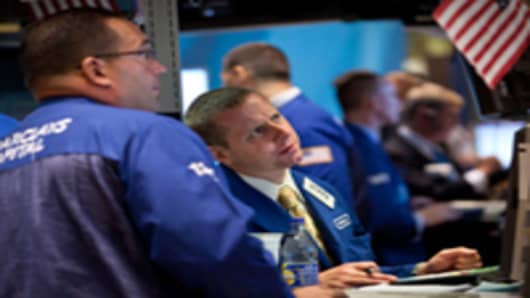Traders have become increasingly concerned about the lack of agreement in Europe over whether the ECB should use its balance sheet to monetize debt, to avoid the further spread of contagion.
Random news headlines, rumors of headlines and just plain fear had markets spinning Thursday. The Dow finished down 134 points at 11,770, but it had dipped another 100 points lower during the trading day. The S&P 500 was down 1.7 percent to 1,216, and the Nasdaq was off nearly 2 percent, tumbling with technology stocks to 2,587.
Investors found safety in the long end of the Treasury market, driving the 10-year yield down to 1.958 percent, but they took funds out of the short end, pushing the yield on the 2-year higher to 0.266 percent. Gold lost 3 percent to $1,719.80, as investors used it as a source of funds amid chatter about traders hitting margin calls. Oil also fell sharply, with West Texas Intermediate losing 3.7 percent to $98.82 per barrel.
Traders were again monitoring the interbank lending market, which was showing signs of stress. The 2-year swap spread widened to 53.85, the highest level since May, 2009. The spread is the difference between the 2-year swap rate and 2-year Treasury yield ,and it's viewed as a measure of credit risk. The spread has widened by about 6 bps in two days.
Meanwhile, the yields on European sovereigns keep rising. Spain paid just under 7 percent to issue 10-year debt Thursday. The yields on Italian 5- and 10-year bonds rose above 7 percent on Thursday, a level seen as unsustainable and the level at which Ireland, Portugal and Greece all sought aid.
The euro, the currency at the center of the crisis of confidence, lost just a hair, finishing the day at 1.3457.
David Gilmore of FX Analytics said, in a note, that European officials do not seem to understand the urgency. "Rumors of rating downgrades are nearly continuous feeding and fed by weakening bond prices. And yet there is little sign that the governments and the ECB get it. They appear uniformly defiant," he wrote. "... Maybe all they see is the euro...it is doing very well relative to the news. I can't help but think this is similar to how the USD (dollar) performed in late 2008 and 2009 in the face of the Lehman failure and financial crisis come recession.
European based banks, firms and funds need euros to fill holes in balance sheets and cash is king in a risk adverse world," he noted. He also said the situation is worse than Lehman because there is more at stake because of the way the European banks are an even larger part of Europe's economy. European banks are also large holders of the sovereign debt that comes under more pressure every day.
"A huge part of the OTC derivatives markets rests with European banks as counterparties and issuers. CDS (credit default swaps) on EZ (euro zone) banks and sovereigns is no insurance in a world of counterpart failed trades and contracts," he wrote.
Ray of Hope
The U.S. economy has been showing some signs of new life, despite the worries about Europe. The stream of better data recently has provided occasional buoyancy to stocks. The weekly jobless claims data Thursday showed claims slipping by 5,000 last week to 388,000, the third week of declines. The four-week average fell below 400,000 for the first time since April.
"So far employers have weathered the storm. They are not laying off en masse," said Credit Suisse economist Jonathan Basile.
"It's a vote of confidence that we're not in full blown cost cutting mode,:" he said. "This is the one data point that's a high frequency leading indicator that's reliable."
Basile said the improvement in claims suggests the November employment report could show improvement over October's 80,000 non farm payrolls.
Still Miffed About MF
Regulators have found that MF Global may have shifted hundreds of millions of dollars in client funds to its own brokerage accounts just days before its bankruptcy filing, the Wall Street Journal reports. MF clients got some reprieve in court Thursday but they are still far from being fully reimbursed.
Follow Patti Domm on Twitter: @pattidomm
Disclaimer




